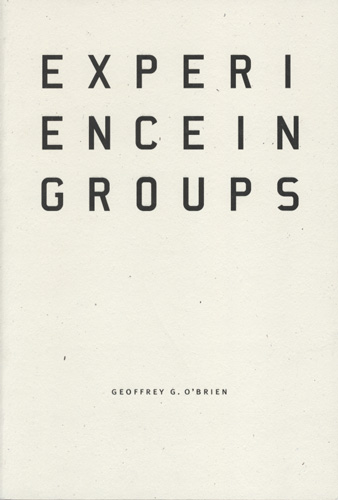Experience in Groups
Let’s start here: Experience in Groups is a book of poetry. Specifically, it’s a book of poetry written by a well-established poet—Geoffrey G. O’Brien—which means that I’m sure that a lot of it went right over my head. But, all I can do is explain the things that I thought I understood, and see where it goes from there. Perhaps everything I say in the next seven hundred words or so is gobbledygook, but then again, there’s a chance that it’s not. Overall, that’s kind of how I felt about Experience in Groups.
Let’s start here: Experience in Groups is a book of poetry. Specifically, it’s a book of poetry written by a well-established poet—Geoffrey G. O’Brien—which means that I’m sure that a lot of it went right over my head. But, all I can do is explain the things that I thought I understood, and see where it goes from there. Perhaps everything I say in the next seven hundred words or so is gobbledygook, but then again, there’s a chance that it’s not. Overall, that’s kind of how I felt about Experience in Groups.
O’Brien teaches for the Prison University Project at San Quentin State Prison, and this definitely comes through in his work. The poems are somber, and in one of the title poems (there are three of them), he even goes as far as to compare hope to an illness:
I have a hunch my experience is
All the plastic of those years
Earlier and later hung up
Young as a company, living
Especially by day or night
Through an illness of believing
In something still to come, to be done
By all or none, not any
He references a “search party finding everything it wants,” and this tells me that O’Brien leans more toward the side of the inmates rather than those that put them there; however, he also makes it apparent that, technically, no matter which side we choose to defend, “There are prisons both sides of the walls.”
One of the prisons that O’Brien alludes to throughout the book seems to be our omnipresent ally and foe: social media. In the same title poem that I mentioned earlier—which, now that I think about it, is my favorite poem in the collection—calls for action. O’Brien suggests ridding ourselves of the phones, the computers, the fake and insecure.
This reliance on facial recognition,
On the intimacy of apathy,Of hours that refuse to slow
Or stop, become space, begin
Reading at a rally, get thrown out,
Check themselves, record the whole
Experience, post it, cross-
Post it, like it themselves, delete it,
Take it back, apologize,
Suspend the account, then and only
Then start a new one, barely use it,
Has got to stop if we are going
To be at least all, lucid, ludic,
While I’m all for the eradication of technology and this pixelated world that we’ve thrown ourselves into, it wouldn’t make any sense. Work hard, then go backward. For what? What was better about the world when Facebook or Snapchat didn’t exist? People talked IRL more frequently? I think that was probably just because we were younger, or unborn. I feel like people talked a lot more often when we couldn’t talk back.
I laughed when I read: “To the sense I’d done something wrong / Yesterday and the days before.” That happens to me all of the time. I’ll find myself on the couch, relaxing, almost happy, and then I’ll think: “Hmm, why was I upset again?” Humankind is hilarious for searching for dread. Some people go to restaurants to complain, others rifle through the past.
Picture all of us doing this: picture all of us thinking similar thoughts, occupying the same spaces, yet trying our hardest to avoid each other like realities that we don’t want to accept. In “The Middle Distance,” O’Brien has a wild thought: “Thought to engage them, / Those walking or stuck / Sitting in the window frame.” Not here, no way. How odd is it that if you speak to someone on the street, you’re considered the kook? Why are there so many of us here, then? It’s like we’re all the forbidden fruit and Adam and Eve.
In “Irrealis (Elegy)” he says: “They were us and looking for us / Looking out for us and from.” As the title of the book suggests, a lot of the poems deal with togetherness. They were us: I don’t think that I have heard a more “together” phrase than that. To deal with togetherness, though, you have to deal with isolation, which the collection does. Experience in Groups deals with isolation and time, the restlessness knowing that we could spoil everything in an instant. There are recurring motifs of trees and falling leaves, open and closed doors, and it’s safe to say that these symbolize the importance of our day-to-day, our hour-to-hour. Some people have their schedules written for them: cell doors open at seven, eat and socialize until ten, etc. But we are the supposed free, the free in the technological prison on the other side of the wall. How we spend our time is paramount, especially as we’re “doing time” here.





